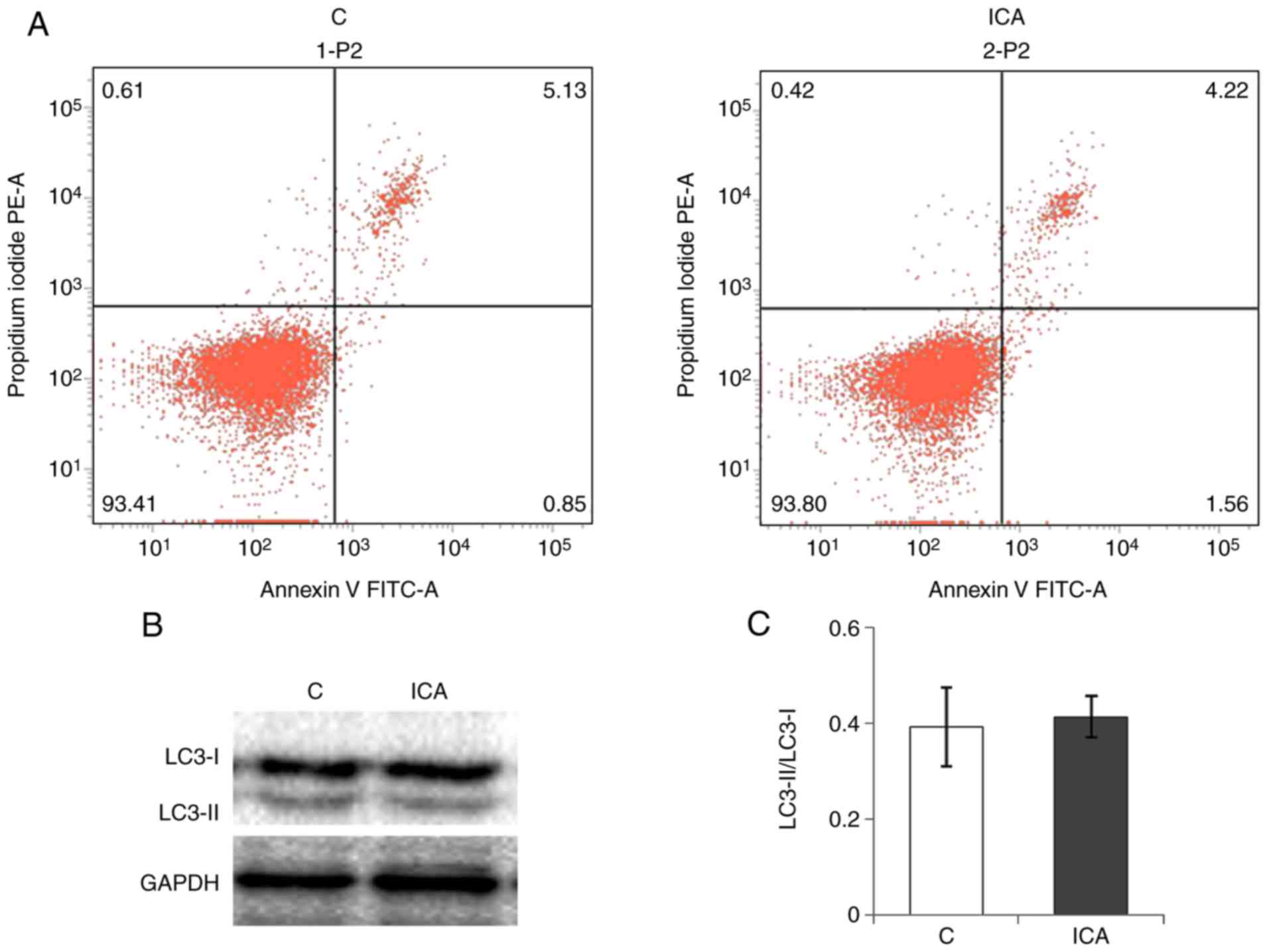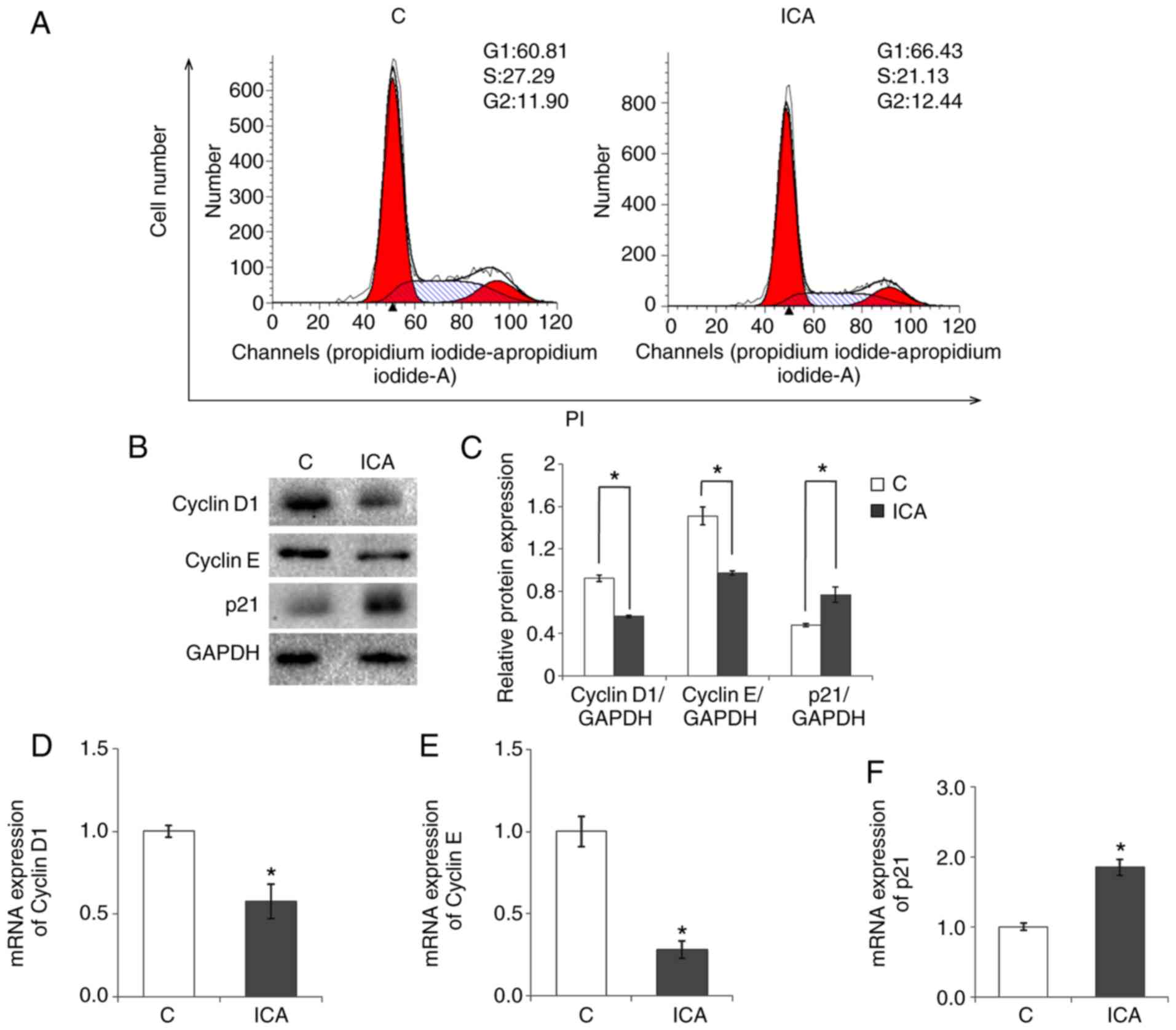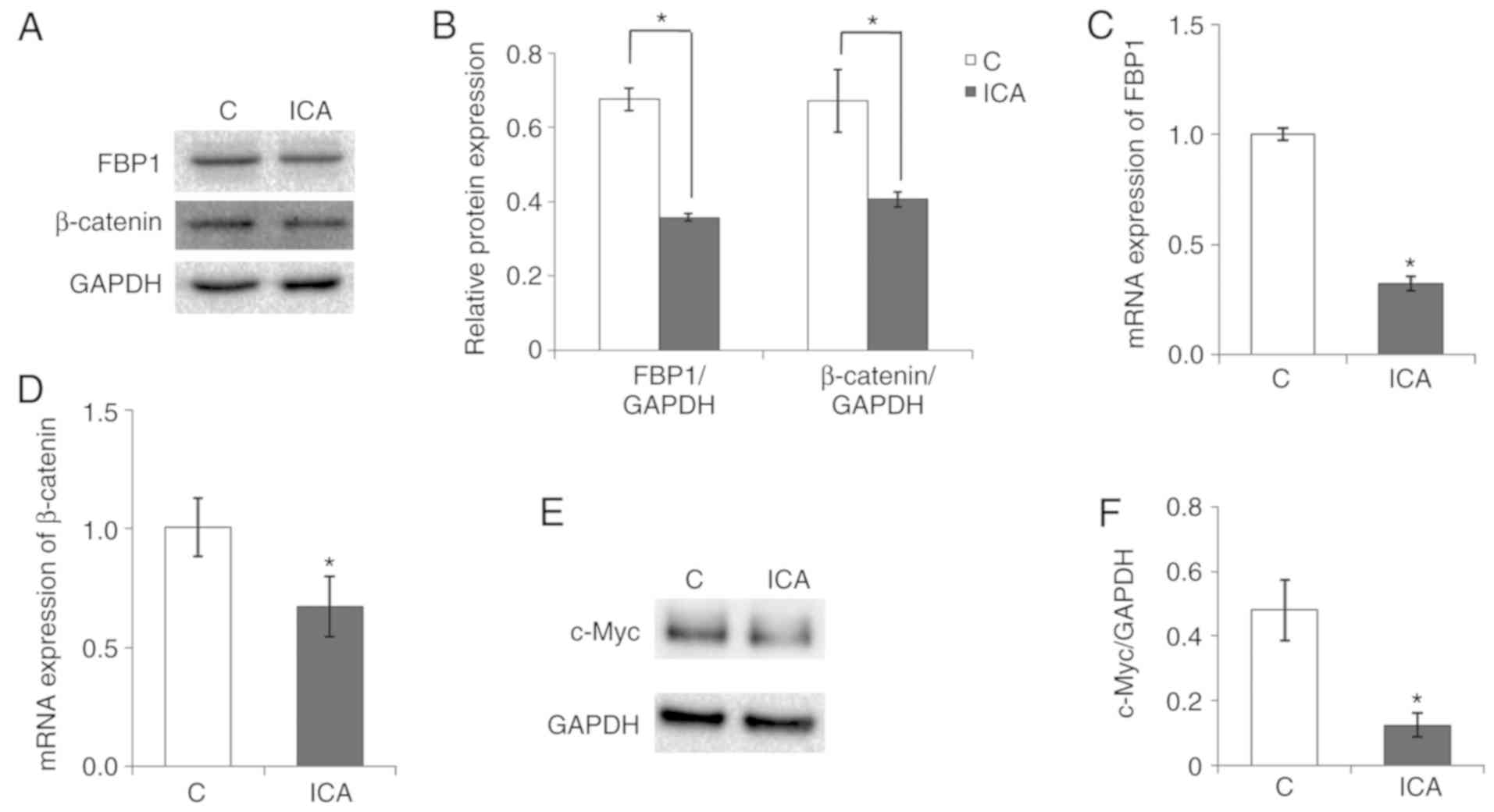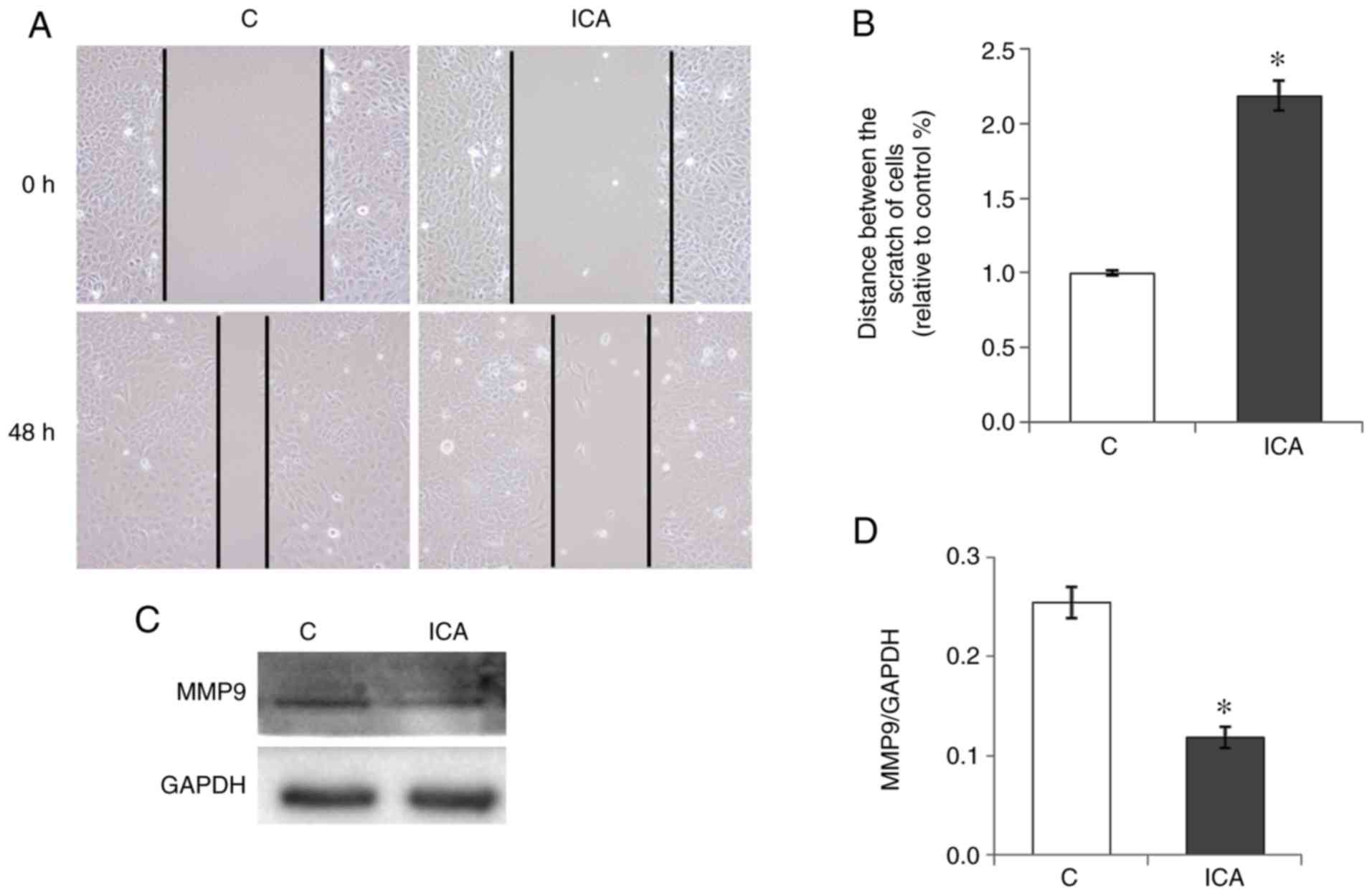|
1
|
Luo J, Zhou J, Cheng Q, Zhou C and Ding Z:
Role of microRNA-133a in epithelial ovarian cancer pathogenesis and
progression. Oncol Lett. 7:1043–1048. 2014. View Article : Google Scholar : PubMed/NCBI
|
|
2
|
Tang AQ, Cao XC, Tian L, He L and Liu F:
Apigenin inhibits the self-renewal capacity of human ovarian cancer
SKOV3-derived sphere-forming cells. Mol Med Rep. 11:2221–2226.
2015. View Article : Google Scholar : PubMed/NCBI
|
|
3
|
Kao YL, Kuo YM, Lee YR, Yang SF, Chen WR
and Lee HJ: Apple polyphenol induces cell apoptosis, cell cycle
arrest at G2/M phase, and mitotic catastrophe in human bladder
transitional carcinoma cells. J Funct Foods. 14:384–394. 2015.
View Article : Google Scholar
|
|
4
|
Calderón-Montaño JM, Burgos-Morón E,
Pérez-Guerrero C and López-Lázaro M: A review on the dietary
flavonoid kaempferol. Mini Rev Med Chem. 11:298–344. 2011.
View Article : Google Scholar : PubMed/NCBI
|
|
5
|
Wang P, Zhang F, He Q, Wang J, Shiu HT,
Shu Y, Tsang WP, Liang S, Zhao K and Wan C: Flavonoid compound
icariin activates hypoxia inducible factor-1α in chondrocytes and
promotes articular cartilage repair. PLoS One. 11:e01483722016.
View Article : Google Scholar : PubMed/NCBI
|
|
6
|
Malz M, Weber A, Singer S, Riehmer V,
Bissinger M, Riener MO, Longerich T, Soll C, Vogel A, Angel P, et
al: Overexpression of far upstream element binding proteins: A
mechanism regulating proliferation and migration in liver cancer
cells. Hepatology. 50:1130–1139. 2009. View Article : Google Scholar : PubMed/NCBI
|
|
7
|
Rabenhorst U, Beinoraviciute-Kellner R,
Brezniceanu ML, Joos S, Devens F, Lichter P, Rieker RJ, Trojan J,
Chung HJ, Levens DL, et al: Overexpression of the far upstream
element binding protein 1 in hepatocellular carcinoma is required
for tumor growth. Hepatology. 50:1121–1129. 2009. View Article : Google Scholar : PubMed/NCBI
|
|
8
|
Chen M, Zhang J, Li N, Qian Z, Zhu M, Li
Q, Zheng J, Wang X and Shi G: Promoter hypermethylation mediated
downregulation of FBP1 in human hepatocellular carcinoma and colon
cancer. PLoS One. 6:e255642011. View Article : Google Scholar : PubMed/NCBI
|
|
9
|
Avigan MI, Strober B and Levens D: A far
upstream element stimulates c-myc expression in undifferentiated
leukemia cells. J Biol Chem. 265:18538–18545. 1990.PubMed/NCBI
|
|
10
|
Duncan R, Bazar L, Michelotti G, Tomonaga
T, Krutzsch H, Avigan M and Levens D: A sequence-specific,
single-strand binding protein activates the far upstream element of
c-myc and defines a new DNA-binding motif. Genes Dev. 8:465–480.
1994. View Article : Google Scholar : PubMed/NCBI
|
|
11
|
Bazar L, Meighen D, Harris V, Duncan R,
Levens D and Avigan M: Targeted melting and binding of a DNA
regulatory element by a transactivator of c-myc. J Biol Chem.
270:8241–8248. 1995. View Article : Google Scholar : PubMed/NCBI
|
|
12
|
Michelotti GA, Michelotti EF, Pullner A,
Duncan RC, Eick D and Levens D: Multiple single-stranded cis
elements are associated with activated chromatin of the human c-myc
gene in vivo. Mol Cell Biol. 16:2656–2669. 1996. View Article : Google Scholar : PubMed/NCBI
|
|
13
|
Rydziel S, Delany AM and Canalis E:
AU-rich elements in the collagenase 3 mRNA mediate stabilization of
the transcript by cortisol in osteoblasts. J Biol Chem.
279:5397–5404. 2004. View Article : Google Scholar : PubMed/NCBI
|
|
14
|
Davis-Smyth T, Duncan RC, Zheng T,
Michelotti G and Levens D: The far upstream element-binding
proteins comprise an ancient family of single-strand DNA-binding
transactivators. J Biol Chem. 271:31679–31687. 1996. View Article : Google Scholar : PubMed/NCBI
|
|
15
|
Zhang J, Xiong X, Hua X, Cao W, Qin S, Dai
L, Liang P, Zhang H and Liu Z: Knockdown of FUSE binding protein 1
enhances the sensitivity of epithelial ovarian cancer cells to
carboplatin. Oncol Lett. 14:5819–5824. 2017.PubMed/NCBI
|
|
16
|
Xiong X, Zhang J, Liang W, Cao W, Qin S,
Dai L, Ye D and Liu Z: Fuse-binding protein 1 is a target of the
EZH2 inhibitor GSK343, in osteosarcoma cells. Int J Oncol.
49:623–628. 2016. View Article : Google Scholar : PubMed/NCBI
|
|
17
|
Li J, Jiang K and Zhao F: Icariin
regulates the proliferation and apoptosis of human ovarian cancer
cells through microRNA-21 by targeting PTEN, RECK and Bcl-2. Oncol
Rep. 33:2829–2836. 2015. View Article : Google Scholar : PubMed/NCBI
|
|
18
|
Livak KJ and Schmittgen TD: Analysis of
relative gene expression data using real-time quantitative PCR and
the 2−ΔΔCT method. Methods. 25:402–408. 2001. View Article : Google Scholar : PubMed/NCBI
|
|
19
|
Peng S, Xu LW, Che XY, Xiao QQ, Pu J, Shao
Q and He B: Atorvastatin inhibits inflammatory response, attenuates
lipid deposition, and improves the stability of vulnerable
atherosclerotic plaques by modulating autophagy. Front Pharmacol.
9:4382018. View Article : Google Scholar : PubMed/NCBI
|
|
20
|
He L, Weber A and Levens D: Nuclear
targeting determinants of the far upstream element binding protein,
a c-myc transcription factor. Nucleic Acids Res. 28:4558–4565.
2000. View Article : Google Scholar : PubMed/NCBI
|
|
21
|
Liu J, Kouzine F, Nie Z, Chung HJ,
Elisha-Feil Z, Weber A, Zhao K and Levens D: The FUSE/FBP/FIR/TFIIH
system is a molecular machine programming a pulse of c-myc
expression. EMBO J. 25:2119–2130. 2006. View Article : Google Scholar : PubMed/NCBI
|
|
22
|
Xiong X, Zhang J, Hua X, Cao W, Qin S, Dai
L, Liu W, Zhang Z, Li X and Liu Z: FBP1 promotes ovarian cancer
development through the acceleration of cell cycle transition and
metastasis. Oncol Lett. 16:1682–1688. 2018.PubMed/NCBI
|
|
23
|
Arend RC, Londoño-Joshi AI, Samant RS, Li
Y, Conner M, Hidalgo B, Alvarez RD, Landen CN, Straughn JM and
Buchsbaum DJ: Inhibition of Wnt/β-catenin pathway by niclosamide: A
therapeutic target for ovarian cancer. Gynecol Oncol. 134:112–120.
2014. View Article : Google Scholar : PubMed/NCBI
|
|
24
|
Steeg PS; Theodorescu: Metastasis, : A
therapeutic target for cancer. Nat Clin Pract Oncol. 5:206–219.
2008. View Article : Google Scholar : PubMed/NCBI
|
|
25
|
Liu F, Cao J, Wu J, Sullivan K, Shen J,
Ryu B, Xu Z, Wei W and Cui R: Stat3-targeted therapies overcome the
acquired resistance to vemurafenib in melanomas. J Invest Dermatol.
133:2041–2049. 2013. View Article : Google Scholar : PubMed/NCBI
|
|
26
|
Xia Y, Lei Q, Zhu Y, Ye T, Wang N, Li G,
Shi X, Shao B, Yin T, Zhao L, et al: SKLB316, a novel
small-molecule inhibitor of cell cycle progression, induces G2/M
phase arrest and apoptosis in vitro and inhibits tumor growth in
vivo. Cancer Lett. 355:297–309. 2014. View Article : Google Scholar : PubMed/NCBI
|
|
27
|
Li S, Li Y, Wen Z, Kong F, Guan X and Liu
W: microRNA-206 overexpression inhibits cellular proliferation and
invasion of estrogen receptor α-positive ovarian cancer cells. Mol
Med Rep. 9:1703–1708. 2014. View Article : Google Scholar : PubMed/NCBI
|
|
28
|
Li S, Dong P, Wang J, Zhang J, Gu J, Wu X,
Wu W, Fei X, Zhang Z, Wang Y, et al: Icariin, a natural flavonol
glycoside, induces apoptosis in human hepatoma SMMC-7721 cells via
a ROS/JNK-dependent mitochondrial pathway. Cancer Lett.
298:222–230. 2010. View Article : Google Scholar : PubMed/NCBI
|
|
29
|
Wang Y, Dong H, Zhu M, Ou Y, Zhang J, Luo
H, Luo R, Wu J, Mao M, Liu X, et al: Icariin exterts negative
effects on human gastric cancer cell invasion and migration by
vasodilator-stimulated phosphoprotein via Rac1 pathway. Eur J
Pharmacol. 635:40–48. 2010. View Article : Google Scholar : PubMed/NCBI
|
|
30
|
Sun Y, Sun XH, Fan WJ and Li AW: Icariin
induces S-phase arrest and apoptosis in medulloblastoma cells. Cell
Mol Biol (Noisy-le-grand). 62:123–129. 2016.PubMed/NCBI
|
|
31
|
Williams GH and Stoeber K: The cell cycle
and cancer. J Pathol. 226:352–364. 2012. View Article : Google Scholar : PubMed/NCBI
|
|
32
|
Odajima J, Wills ZP, Ndassa YM, Terunuma
M, Kretschmannova K, Deeb TZ, Geng Y, Gawrzak S, Quadros IM, Newman
J, et al: Cyclin E constrains Cdk5 activity to regulate synaptic
plasticity and memory formation. Dev Cell. 21:655–668. 2011.
View Article : Google Scholar : PubMed/NCBI
|
|
33
|
Zan PF, Yao J, Wu Z, Yang Y, Hu S and Li
GD: Cyclin D1 gene silencing promotes IL-1β-induced apoptosis in
rat chondrocytes. J Cell Biochem. 119:290–299. 2018. View Article : Google Scholar : PubMed/NCBI
|
|
34
|
Colussi D, Brandi G, Bazzoli F and
Ricciardiello L: Molecular pathways involved in colorectal cancer:
Implications for disease behavior and prevention. Int J Mol Sci.
14:16365–16385. 2013. View Article : Google Scholar : PubMed/NCBI
|
|
35
|
Zheng Q, Liu WW, Li B, Chen HJ, Zhu WS,
Yang GX, Chen MJ and He GY: Anticancer effect of icaritin on human
lung cancer cells through inducing S phase cell cycle arrest and
apoptosis. J Huazhong Univ Sci Technolog Med Sci. 34:497–503. 2014.
View Article : Google Scholar : PubMed/NCBI
|
|
36
|
Ren Y, Zhu F and Liu Z: Inhibitory effect
of icariin on osteosarcoma cell proliferation via the Wnt/β-catenin
signaling pathway. Oncol lett. 16:1405–1410. 2018.PubMed/NCBI
|
|
37
|
Rask K, Nilsson A, Brännström M, Carlsson
P, Hellberg P, Janson PO, Hedin L and Sundfeldt K: Wnt-signalling
pathway in ovarian epithelial tumours: Increased expression of
beta-catenin and GSK3beta. Br J Cancer. 89:1298–1304. 2003.
View Article : Google Scholar : PubMed/NCBI
|
|
38
|
Friedl P and Wolf K: Tumour-cell invasion
and migration: Diversity and escape mechanisms. Nat Rev Cancer.
3:362–374. 2003. View Article : Google Scholar : PubMed/NCBI
|



















